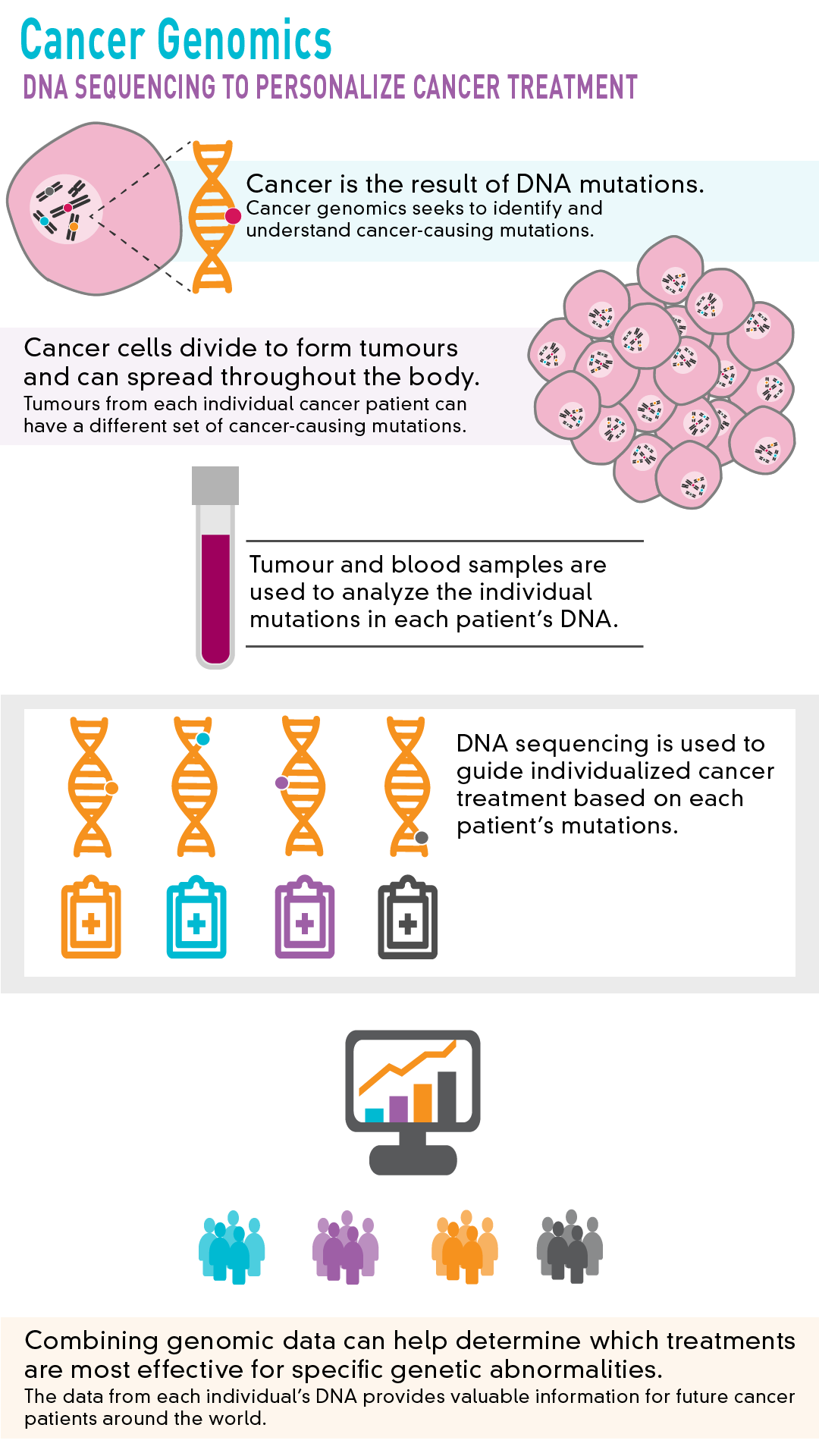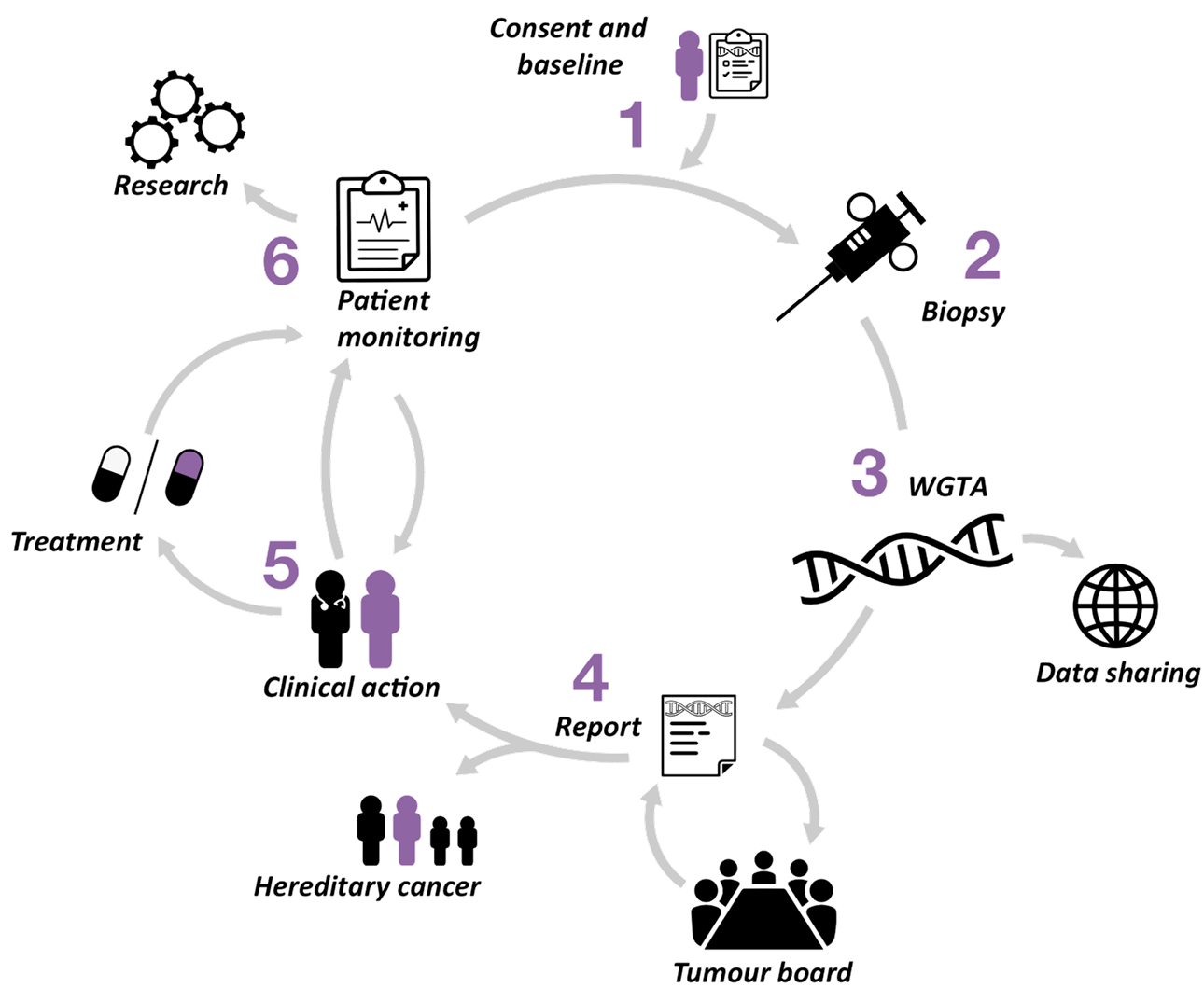POG for patients & public
What causes cancer?
If malignant, that tumour sheds "daughter" cells containing the same or more damaged genes, which can travel through the body's lymph system. These cells in turn "seed" and grow into new tumours elsewhere in the body, which is a process called metastasis. Understanding the exact genetic changes at each of these stages is the focus of genome sequencing in cancer research.

What is cancer genomics?
Every tumour is as unique as the patient from which it came. Everyone carries a unique set of genes inherited from their parents—the “normal” or inherited genome. Genetic changes to the inherited genome can influence cancer development, progression and response to treatment. Cancer genomics aims to decode each patient’s normal and cancer genomes, enabling clinicians to determine the best course of treatment tailored for each individual.

POG Eligibility and Enrollment
Who is eligible for POG?
This is a highly experimental research program for cancer patients being treated and consistently followed at BC Cancer. There are many specific inclusion criteria but the main ones to consider are:
- Patients with incurable, metastatic disease;
- Patients with limited or no prior chemotherapy;
- Fit and functionally well;
- Cancer that can be easily biopsied;
- Permanent B.C. residents receiving care and follow up in B.C.;
- Other disease/type specific criteria may also apply to individual cases.
How do patients get enrolled in POG?
For more information on POG and eligibility, BC patients should speak to their medical oncologist at their next scheduled visit. There are many other provinces with cancer genomic studies, patients should discuss their interest in clinical trials with their medical oncologist to explore their local options.
Further questions regarding POG can be directed to: POGinfo@bcgsc.ca.
How POG works

Collection
Samples (a biopsy sample and a blood sample) are collected from eligible patients. Additional information about patient diagnosis, past treatments and previously tested samples is also collected. All samples are assessed to confirm their quality and suitability for genome sequencing.
Data Generation and Analysis
From each sample, genome (DNA) and transcriptome (RNA) sequence data are generated (WGTA, whole genome and transcriptome analysis) at Canada's Michael Smith Genome Sciences Centre. Professional data analysts (called computational biologists) analyze these data, looking for genetic alterations that influence cancer formation, progression, metastasis and treatment resistance.
Reporting
The results from the analyses are reported back to the clinician. The POG team reviews these and discusses possible interpretations of the data at the weekly tumour board meeting. The medical oncologist then works with the patient to decide if and how the information can inform decisions about treatment
Follow-up
Over time, the clinician reports back to the POG team on the progress of the patient, including whether the patient’s current treatment was informed by POG and what their current status is.
Research and Data Sharing
In addition to informing individualized treatment planning for BC Cancer patients, the POG program is providing a rich and extensive dataset for cancer research. Patients enrolled in the POG program consent to having their genomic data anonymously shared with the broader scientific community, each patient thereby contributing to the advancement of knowledge for the benefit of patients around the world. Sharing of these data is vitally important for cancer researchers to discover subtle genetic patterns that would be impossible to detect in one individual, revealing themselves only when hundreds of datasets are combined and analyzed as a whole.
Online resources
Canada's Michael Smith Genome Sciences Centre at BC Cancer: Glossary
A comprehensive glossary of important and commonly used genomics terms.
Coping with Cancer: BC Cancer helps those living with or affected by cancer to cope with the physical, practical, emotional and psychological aspects of their care.
Genetics Home Reference is consumer-friendly information compiled by the U.S. National Library of Medicine. Resources include a searchable gene database, information on chromosomes and mtDNA as well as chapters covering basic concepts and explanations in human genetics.
Genomics England’s "The 100,000 Genome Project" offers a number of free to access infographics and videos designed to help users understand genomics. Topics include genomics in healthcare, genomics in cancer, understanding genomics, the genome and DNA, as well as the sequencing of genomes.
Human Genomics in Global Health: A source of genomics information, publications and news compiled by the World Health Organization (WHO).
The Tech Museum of Innovation is hosted by the Department of Genetics, Stanford University. The website offers consumer-friendly information and news about genetics, online exhibitions, free online videos, and allows users to have questions answered by a geneticist online. The website also offers free online courses and certificate training in genetics which users can pay for.
BC Cancer Patient Education Resources
A collection of free patient education videos and online courses produced and compiled by BC Cancer to help patients learn more about their cancer and available treatment options. These resources are free to access online, and many are available to loan free in DVD format at BC Cancer Libraries.
Coursera is a large, searchable online repository of free courses and pay to access courses from universities and companies around the world.
Future Learn offers self-paced courses for health professionals, practitioners and the general public. "Understanding Genomics" is a collection of courses is designed to teach users about the applications and importance of genomics in diagnosis and treatment as well as healthcare research. Users can register for free in order to access the courses, and connect with other researchers and clinicians through the online platform.
Learn about cancer genomics from the National Cancer Institute.
Create an account through Genome Medical for free access to genomics resources including a collection of videos relevant to genomics, whole genome sequencing and genomics in healthcare.
The Genomics Education Programme offers a full range of educational resources and courses, from short films to a full Master’s degree.
Contact us
For more information: POGinfo@bcgsc.ca
BC Cancer Foundation is the fundraising partner of BC Cancer, which includes BC Cancer Research. Together with our donors, we are changing cancer outcomes for British Columbians by funding innovative research and personalized treatment and care.